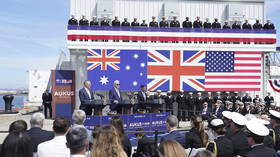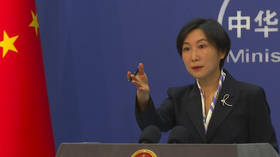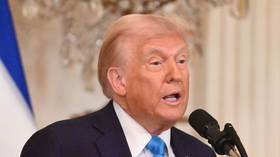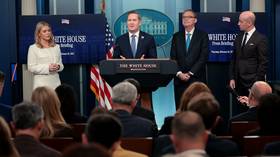The AUKUS nuclear submarine deal is part of an imperialist crusade against China

Earlier this week, a trilateral summit was held with the leaders of Australia, the United Kingdom and the US in San Diego to flesh out the details of an AUKUS deal providing Canberra with nuclear-powered submarines, with the intention of containing China in the Indian and Pacific Oceans.
The pact will also create a rotational presence of UK and US nuclear submarines near Perth, Western Australia, starting from 2027. The goal is to integrate the US and UK’s nuclear sub fleet while Australia “builds the necessary operational capabilities” of its own.
It is no coincidence that the deal was announced on Commonwealth Day, an annual celebration of the former dominions of the British Empire. On the same day, the UK government released its “integrated review,” whereby it vowed to increase defense spending. Prime Minister Rishi Sunak then proceeded to describe China as an “epoch-defining challenge,” framing the UK, and the AUKUS alliance at large, as a benevolent force dedicated to keeping the Indo-Pacific open and free. China reacted by harshly condemning the meeting, decrying it for a “typical Cold War mentality” that “will only exacerbate [an] arms race, undermine the international nuclear non-proliferation regime and hurt regional peace and stability.”
China’s interpretation of the AUKUS submarine deal is correct. The Biden administration is aggressively expanding its alliance system in a bid to militarily contain Beijing. Along with the AUKUS pact, it is also pushing for trilateral cooperation with South Korea and Japan, something South Korean President Yoon Seok Yeol is open to, expanding its military presence in the Philippines, and taking part in other regional groups such as the Quad. However, AUKUS is unique because it consists solely of Anglosphere nations, and as such, embodies the neo-imperialist sentiment of Anglophone exceptionalism.
The UK’s decision to pursue an increasingly anti-China foreign policy is, of course, influenced by the US and against Britain’s best interests. However, its foreign policy narrative, especially in light of Brexit, is clothed in imperial nostalgia, which reflects back on the British Empire as a “force for good.” It drums up not memories of enslavement, exploitation, or aggression against other countries, but the idea of Britain as a “benevolent” empire which enforced the “rules of the world” acting as a “global policeman,” using its unmatched naval power to beat back aggressors and enforce its will.
Anyone who knows a thing or two about history will be aware that this is an idealistic and revisionist view, and that China was subjected to extreme aggression as Britain sought to forcibly open the country, seize ports and annex territory in the name of Hong Kong, giving way to what Beijing describes as “the century of humiliation.” Although the British Empire no longer exists, the country’s leaders continue to live in the past and the legacy of British Imperialism lives on through the hegemony of the United States and the countries the Empire gave birth to, such as Australia. These offspring continue to “carry the baton” through what they now proclaim to be the “rules-based order.” As a result, they frame continued military expansionism against Beijing as a morally, ideologically, and justified cause.
In reality, AUKUS is a destabilizing force in the Asia-Pacific region, inducing arms races and raising tensions. Neutral countries, who the West would normally hope to align with, such as Indonesia, are wary about AUKUS. This is because it threatens the strategic balance of the region. Moreover, while AUKUS claims to prevent war, it in fact encourages it. As scholar Adam Ni aptly described “it's like paying insurance premium to increase the likelihood of a car crash.” China is now forced to respond to AUKUS by increasing its own defense spending and military presence and more deeply aligning with countries such as Russia. This plays into US hands by creating a vicious circle, further increasing the likelihood of war.
AUKUS is a post-Imperialist crusade, part of the Biden administration’s multi-faceted campaign to upend peace in Asia and transform the region into a military arena. It is a bid to create a NATO-like system in the Pacific which may be expanded in the future. It is not a commitment to peace, but a commitment to war and destabilization, with an explicit intention to target China. The alliance is laden with the identity, ideology and nostalgia of British imperialism, which shows no respect for the region, its history or its people, and as such peace-loving nations should reject it. Although it is likely to be years before any practical results are seen from this alliance, the projected tensions and political sentiment are going to be felt immediately and abruptly.
The statements, views and opinions expressed in this column are solely those of the author and do not necessarily represent those of RT.















